文章目录
- 一、list源码分析
- 1.分析构造函数
- 2.分析尾插等
- 二、手把手教你写一个list
- 1.结点声明
- 2.list类的成员变量
- 3.list类的默认构造函数
- 4.list类的尾插
- 5.结点的默认构造函数
- 6.list类的迭代器
- 7.设计const迭代器
- 8.list的insert、erase等接口
- 9.size
- 10.list的clear
- 11.list的析构函数
- 12.list拷贝构造函数
- 13.赋值运算符重载
- 14. 测试代码
- 三、模拟list类的全部代码
一、list源码分析
1.分析构造函数
list的分析与vector的分析思路是一样的,我们一开始最先看到的就是这个结点的结构体,在这里我们可以注意到这是一个双向链表。有一个前驱指针,一个后继指针。然后在有一个存储数据的空间
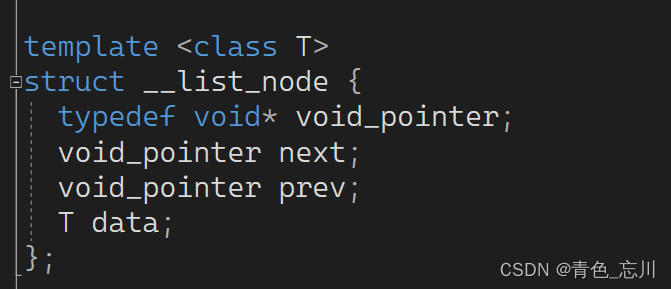
其次我们还会注意到,它的迭代器是一个自定义类型,而非原生指针。这与vector是不同的,至于迭代器为什么要这么设计,我们暂时还看不懂,那么我们就往下继续看,先把大结构给研究出来

那么我们继续找成员变量,在这里我们就找到了成员变量,但是这个类型我们很明显看不懂,于是我们速览定义去查看

可以看到这个实际上还是一个指针。但是这个指针我们还是看不懂,于是我们继续去速览定义,于是就找到了这里

这里我们可以注意到这个结点的类型其实就是一个类模板,这个模板正好就是我们一开始就看到的用结构体定义的一个结点。于是我们就清楚了,这个成员变量实际就是一个指针,这个指针指向一个结点。这样一想象,就有点类似于我们在c语言使用链表时候的头节点了。
那么接下来,我们应该分析一下构造函数是什么样子的。
不难注意到,就在成员变量的下方,正好就是一个无参的构造函数。也就是默认构造函数
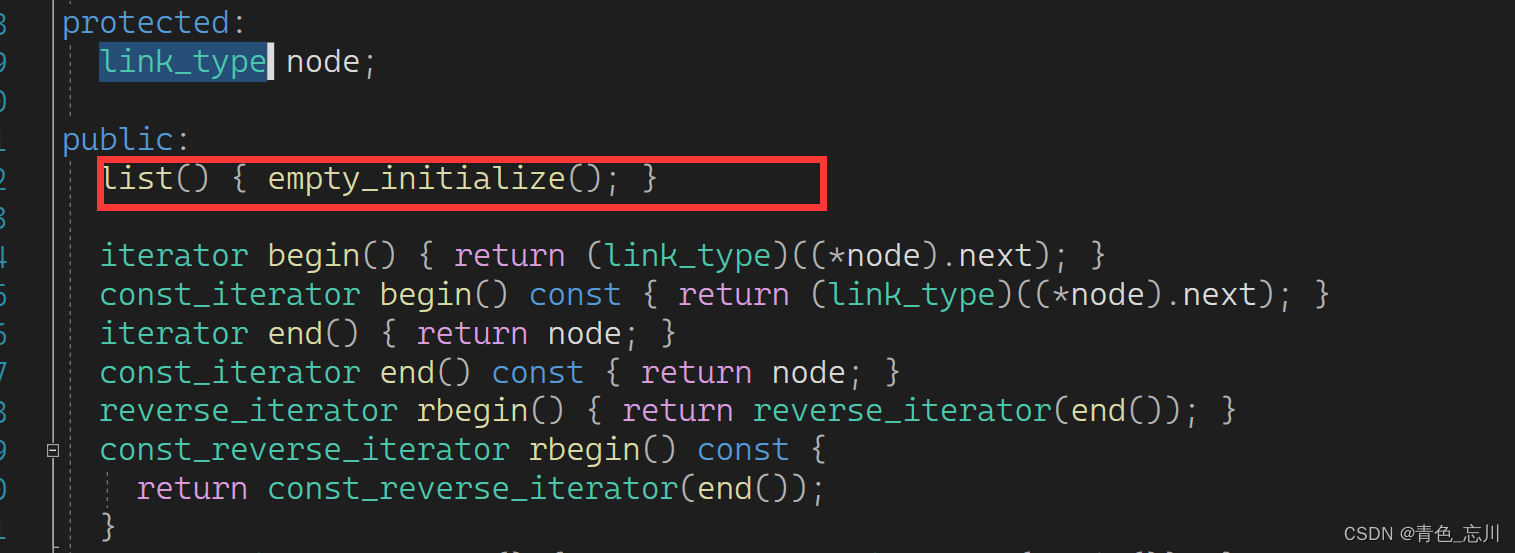
但是在这里它又封装了一层函数,于是乎我们继续深入查看
如下所示,我们看到了具体的函数内容,从名字上来看,get_node 不出意外就是开空间的。也就是得到一个结点,然后返回这个结点指针。这样一来,我们的成员变量就获取的实际的一个结点,然后让它的next和prev都指向自己,这样一来这个结点形成一个自循环。现在就能看出来这是一个带头双向循环链表了

那么这个得到结点的函数内部究竟是什么,我们还可以继续深入查看一下

如上图所示,这里的allocated设计到空间配置器。这里我们就先不做了解了。后序在详细介绍
我们不妨顺着这个思路往下继续理解,下面刚好有一个put_node,这个函数其实就是释放结点的。
在后面还有这样一个函数,这个函数是creat_node不难理解,这个就是获取一个结点,先给这个结点开空间,然后调用构造函数。等一系列操作。

既然这里涉及到一个构造,那么我们继续深入,看看这个构造里面是什么东西?这里其实我们还是有点懵的,这里其实就涉及到了C++11的内容了,我们就先不管它了,我们只需要这道能new出来空间就行了

2.分析尾插等
好了,构造函数分析完了,那么我们继续分析一下push_back系列的插入函数
我们不难注意到,这里的push_front和push_back都是复用了insert接口,那么我们就直接去分析一下insert接口吧

我们可以分析出来,它调用的是这个函数

在这里我们也是不难理解的,先创造一个结点,然后进行连接。现在我们也基本读懂了这个大体的框架了
这里还需要注意的是:由于一开始的结点里面的指针都是空指针,导致后面需要经历很多的强制类型转化。其实这里大可不必,我们如果一开始就定义好指针的类型自然是最好的。
二、手把手教你写一个list
1.结点声明
如下所示,是我们的结点的定义,对于这里的定义,我们可能刚看到的时候会比较陌生感,又有一丝熟悉感,这是正常的。多写写就熟悉了。我们现在来深入了解一下这个结点是如何进行声明的,我们这里和c语言的链表采用同样的方法,使用一个结构体,但是这里的结构体已经非比结构体了。因为C++对结构体进行了升级,这里应该是一个类,使用struct的话会是类成员变量默认为公有的成员变量,方便类外的变量可以随时访问。
其次,C++中对结点进行定义的时候可以只写类名,这与class是一样的。注意不要忘记带上模板参数T,因为我们写的结点也只是一个模板。因为类名不是类型,他实例化以后可以有各种各样的结点类型。
template<class T>
struct list_node
{
list_node<T>* _next;
list_node<T>* _prev;
T _val;
};
2.list类的成员变量
由于我们的结点是一个模板,对于它而言,它的类型就比较繁琐,我们可以在list类里面使用typedef进行一次重命名。然后再私有里面再定义一个指针,这个指针就是一个结点指针。
template<class T>
class list
{
typedef list_node<T> Node;
public:
private:
Node* _head;
};
3.list类的默认构造函数
如下所示,我们定义好了成员变量以后,我们就写一个默认构造函数,当我们对这个链表类进行实例化的时候,自动调用这个默认构造函数,这个默认构造函数会为成员变量的头节点指针分配实际的空间,在new Node空间的时候,会调用它Node(即list_node<T>)类的默认构造函数函数。从而成功的开辟好这块空间。
list()
{
_head = new Node;
_head->_next = _head;
_head->_prev = _head;
}
4.list类的尾插
如下所示,我们的尾插逻辑也是比较简单的,先利用我们传过来的val去开辟一个新的结点,注意这里开辟新结点的时候使用new的话可以直接带一个括号去调用它的构造函数
void push_back(const T& val)
{
Node* newnode = new Node(val);
Node* tail = _head->_prev;
tail->_next = newnode;
newnode->_prev = tail;
newnode->_next = _head;
_head->_prev = newnode;
}
5.结点的默认构造函数
有了上面的分析之后,我们现在缺的就是一个结点的默认构造函数,我们直接给一个缺省值,使用T()就是一个匿名对象来初始化,对于内置类型也是同样适用的。然后我们使用初始化列表即可。
list_node(const T& val = T())
:_next(nullptr)
,_prev(nullptr)
,_val(val)
{}
6.list类的迭代器
首先我们思考一下,可否像vector一样直接在类里面typedef 一个迭代器?

答案是显然不可以的,这样大错特错。vector可以这样使用的原因是数组天生就是一个迭代器。解引用后就能找到对应的值。
而对于list,首先它就是不连续的,指针加1后,地址早已不知道跑到哪个结点去了。其次这里仅仅只是结点的指针,解引用后,找到的仅仅只是结点,我们还需要进一步解引用才能找到对应的真正的值。
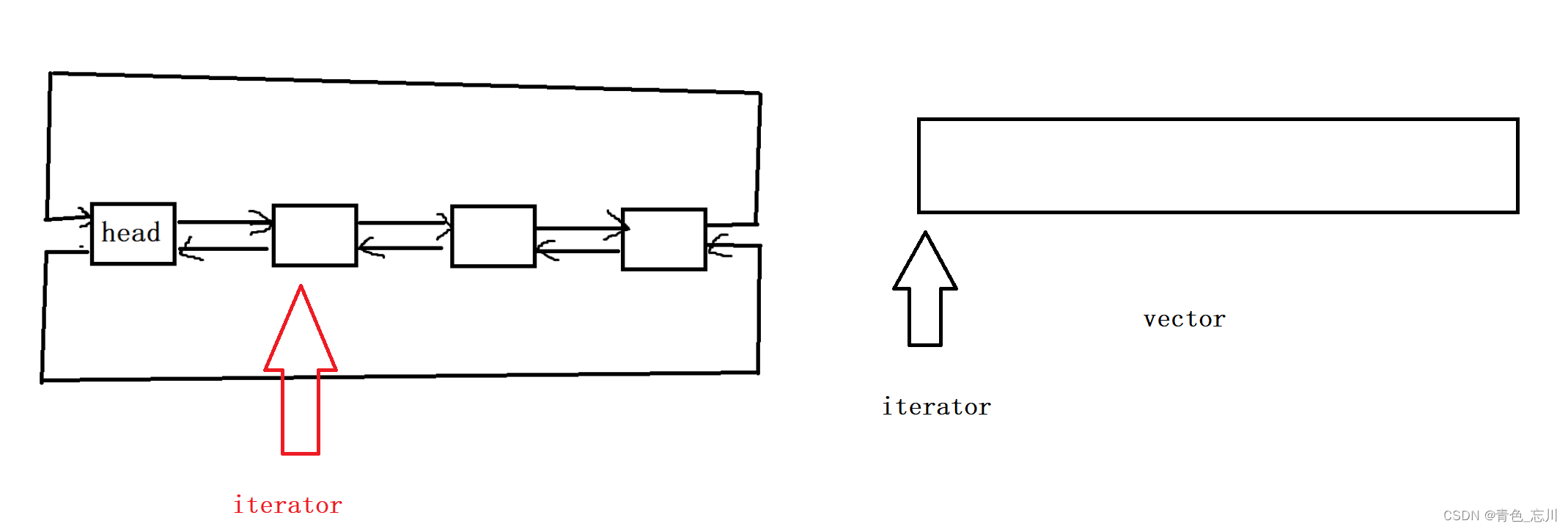
总之直接typedef的话,会使得迭代器的++和解引用操作均失效了,这时候我们只能使用运算符重载了。才能解决这个问题。既然要运算符重载,这里我们最好再次封装一个类出来。因为如果不封装一个类出来的话,我们无法完成此处的运算符重载。
如下所示,是我们实现的iterator的类
template<class T>
struct __list_iterator
{
typedef list_node<T> Node;
Node* _node;
__list_iterator(Node* node)
:_node(node)
{}
T& operator*()
{
return _node->_val;
}
__list_iterator<T>& operator++()
{
_node = _node->_next;
return *this;
}
bool operator!=(const __list_iterator<T>& it)
{
return _node != it._node;
}
};
这个类我们使用了一个结构体去封装,在这个结构体中,我们只有一个成员变量,这个成员变量是结点类的指针,用于指向某一个结点, 在我们一开始定义出迭代器的时候,我们需要先写一个构造函数,用于迭代器的初始化。即需要传一个参数node来控制。
与之对应的,我们在list中就需要写出对应的begin和end函数,来返回迭代器。
typedef __list_iterator<T> iterator;
iterator begin()
{
//return _head->_next //单参数的构造函数支持隐式类型转换
return iterator(_head->_next);
}
iterator end()
{
return iterator(_head);
}
在这里的迭代器中,首先返回值肯定是iterator,根据我们前面iterator函数的构造函数,我们可以利用匿名对象去构造一个迭代器对象。这里我们正好传一个参数,这个参数根据我们函数的特性去传递,在list类中,它的成员变量就是一个结点类指针,我们可以直接传递该节点的下一个指针,用这个指针刚好就能构造出这个迭代器类型。
现在我们已经获得了这个迭代器,这个迭代器本质就是一个类,而不是指针。由于结点是无法直接正常解引用的,那么我们就需要去在迭代器类中去重载一个*运算符,让他看上去就像一个指针一样,试想一下,我们解引用出来的结果应该是什么呢?其实就是该迭代器类型里面这个唯一的公有成员变量_node所指向的结点中的_val,这个_val就是我们所需要返回的值。这个值的类型是T,由于解引用后我们还可以去修改这个结点里面的值,所以我们还需要传引用返回
除此之外,我们还需要一个++运算符重载,在这个运算符重载中,我们也很明确,我们需要返回的类型就是迭代器类型。那么我们是如何进行++的呢?,因为我们的成员变量就是指向一个结点的指针,所以我们直接让这个结点的指针去往后移动一次即可。由于是前置++,所以我们先移动,在返回*this,因为*this就是我们的该迭代器。这里我们注意,我们可以传引用返回,也可以传值返回。因为无非就是多了一个类。如果传引用返回,另外一个类改变的时候,这个it所指向的内容也将改变。如果传值返回就不会了。
为了方便我们测试,我们还需要再写一个!=的运算符重载,这个运算符重载我们在上面也给出来了,就是简单的进行比较即可。
我们使用如下代码进行测试(这里的测试代码与list在同一个命名空间,所以不需要域作用限定符)
void test1()
{
list<int> lt;
lt.push_back(1);
lt.push_back(2);
lt.push_back(3);
lt.push_back(4);
lt.push_back(5);
list<int>::iterator it = lt.begin();
while (it != lt.end())
{
cout << *it << " ";
++it;
}
cout << endl;
}
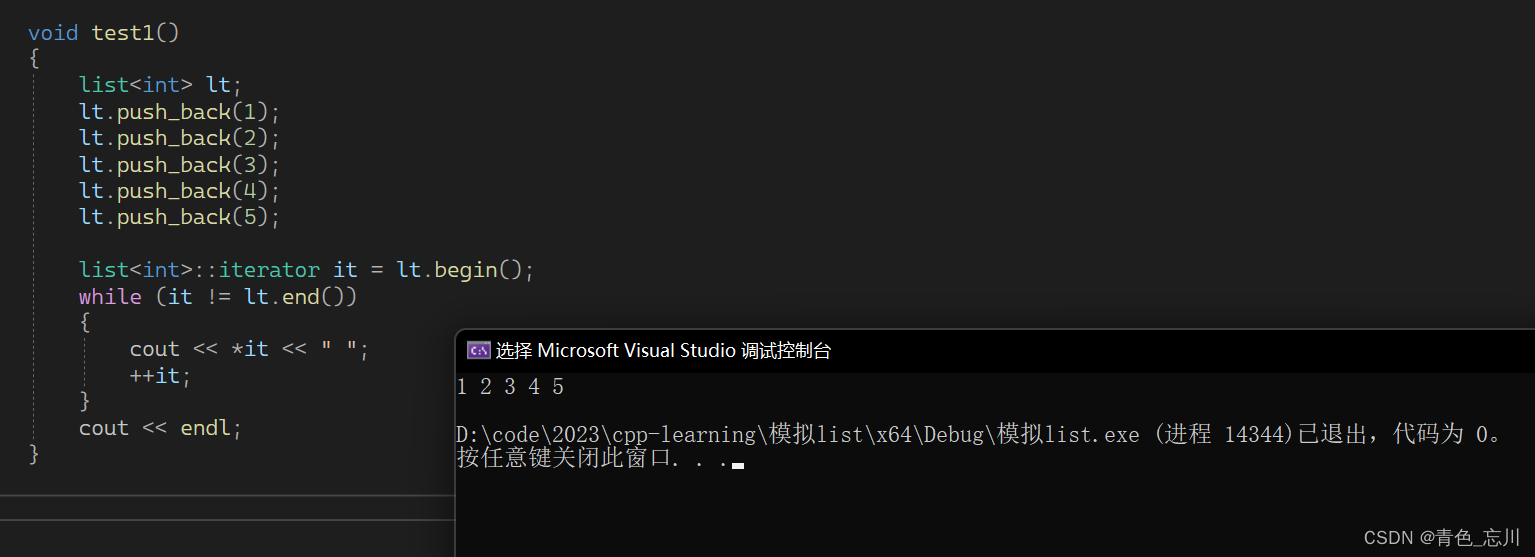
总而言之,list的迭代器确实比较抽象一些,这里存在三个类之间的各种纠缠。所以导致比较抽象,但是认真分析之后,还是比较容易读懂的。
那么我们再来思考一下,这里是否需要拷贝构造呢?事实上,这里我们可以不需要写拷贝构造函数,因为库里面会默认生成一个浅拷贝,而我们这里也就需要一个浅拷贝。不需要深拷贝。所以我们不需要写。
那么我们在思考一下,我们这里有很多个迭代器,迭代器里面的指针指向同一块空间,那么这里是否会产生崩溃呢?其实是不会的,因为我们就没写析构函数。那么为什么不写析构呢?其实这是因为这个结点就不是我这个迭代器去生成的,迭代器只是拿走了这个结点的地址罢了。要析构也轮不到迭代器去析构,应该让list去析构。迭代器只是借助这个结点去访问容器。迭代器只是为了访问,而不是去管理容器。
我们这里先将迭代器的基本操作写的稍微完善一些
template<class T>
struct __list_iterator
{
typedef list_node<T> Node;
Node* _node;
__list_iterator(Node* node)
:_node(node)
{}
T& operator*()
{
return _node->_val;
}
__list_iterator<T>& operator++()
{
_node = _node->_next;
return *this;
}
__list_iterator<T> operator++(int)
{
__list_iterator<T> tmp(*this);
_node = _node->_next;
return tmp;
}
bool operator!=(const __list_iterator<T>& it)
{
return _node != it._node;
}
bool operator==(const __list_iterator<T>& it)
{
return _node == it._node;
}
};
7.设计const迭代器
我们先来看看下面这种设计方法是否可行?

先说结论:不行,为什么不行呢?这是因为const迭代器要求的是迭代器指向的内容不可以被修改,迭代器本身可以被修改。而这里呢?我们的对迭代器类型加上了const,我们的迭代器本身就是一个类,对一个类加上一个const,这是让这个类对象无法被修改啊。里面的成员变量都不可以被修改,而我们迭代器对象里面的指针指向的才是结点指针。我们这样一来,这个迭代器里面的指针无法移动了。也就意味着不满足我们的迭代器本身可以被修改的性质了。它就无法调用前置++,后置++了。
那么我们到底该如何控制指向的数据不可被修改呢?
答案就是在这里加上const
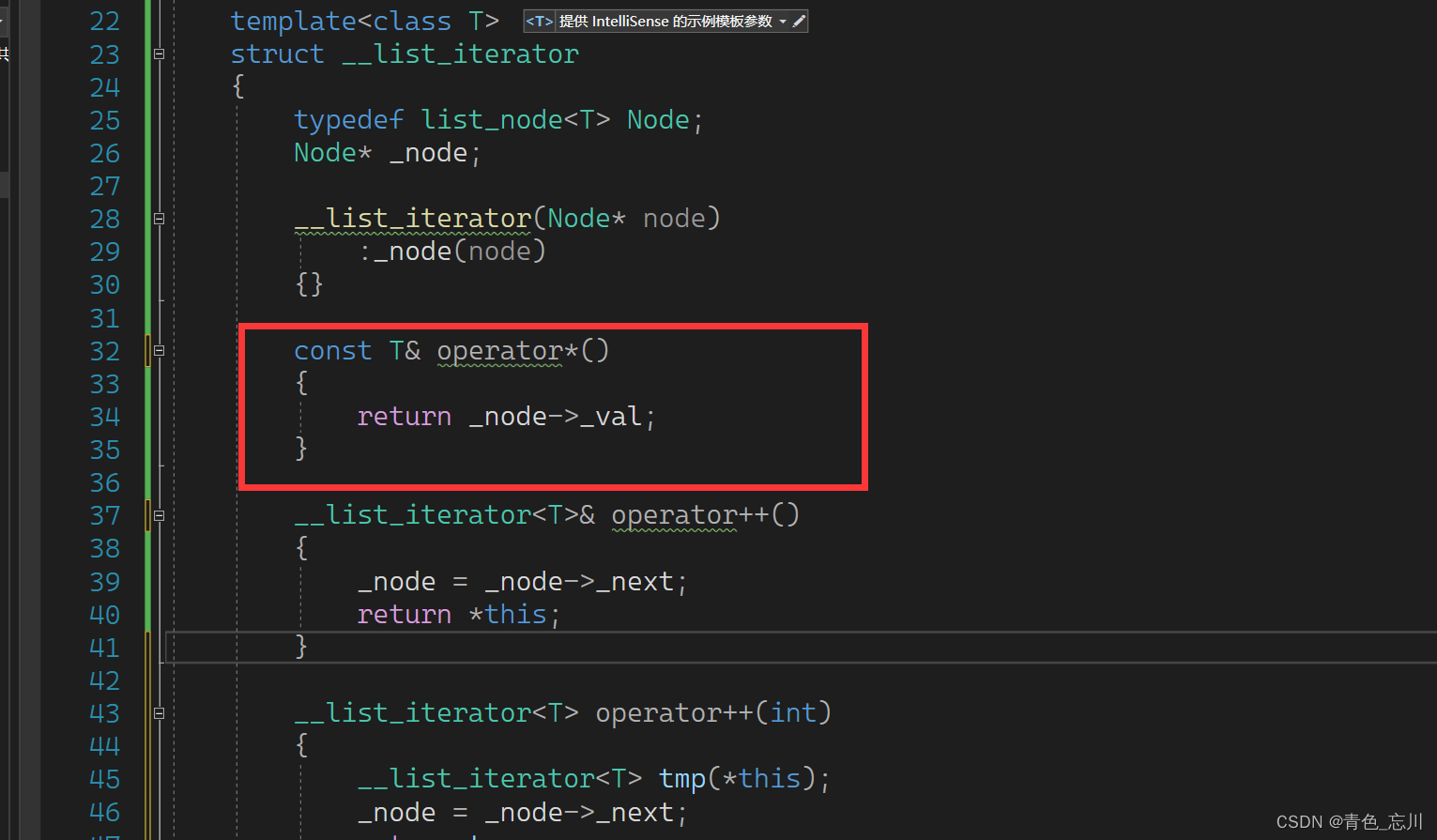
这样一来返回的就是const引用,自然就无法进行修改内容了。
这样一来,我们就有了一种实现const迭代器的想法了。我们可以拷贝一份原来的迭代器,然后改变一下类名和解引用这个成员函数的返回值即可
template<class T>
struct __list_const_iterator
{
typedef list_node<T> Node;
Node* _node;
__list_const_iterator(Node* node)
:_node(node)
{}
const T& operator*()
{
return _node->_val;
}
__list_const_iterator<T>& operator++()
{
_node = _node->_next;
return *this;
}
__list_const_iterator<T> operator++(int)
{
__list_const_iterator<T> tmp(*this);
_node = _node->_next;
return tmp;
}
bool operator!=(const __list_const_iterator<T>& it)
{
return _node != it._node;
}
bool operator==(const __list_const_iterator<T>& it)
{
return _node == it._node;
}
};
即如上代码所示,但是这样设计太过于冗余了。不过这个也是可以正常运行的,我们先补两个接口
const_iterator begin() const
{
//return _head->_next //单参数的构造函数支持隐式类型转换
return const_iterator(_head->_next);
}
const_iterator end() const
{
return const_iterator(_head);
}
如上所示代码中,要特别注意的是我们访问这两个接口时候使用的是list类,并且是const的对象,那么一定要加上const,否则就是权限放大了。
我们来测试一下const迭代器,我们只需要在上面的测试用例中补上一个Print接口即可
void Print(const list<int> lt)
{
list<int>::const_iterator it = lt.begin();
while (it != lt.end())
{
cout << (*it) << " ";
++it;
}
cout << endl;
}
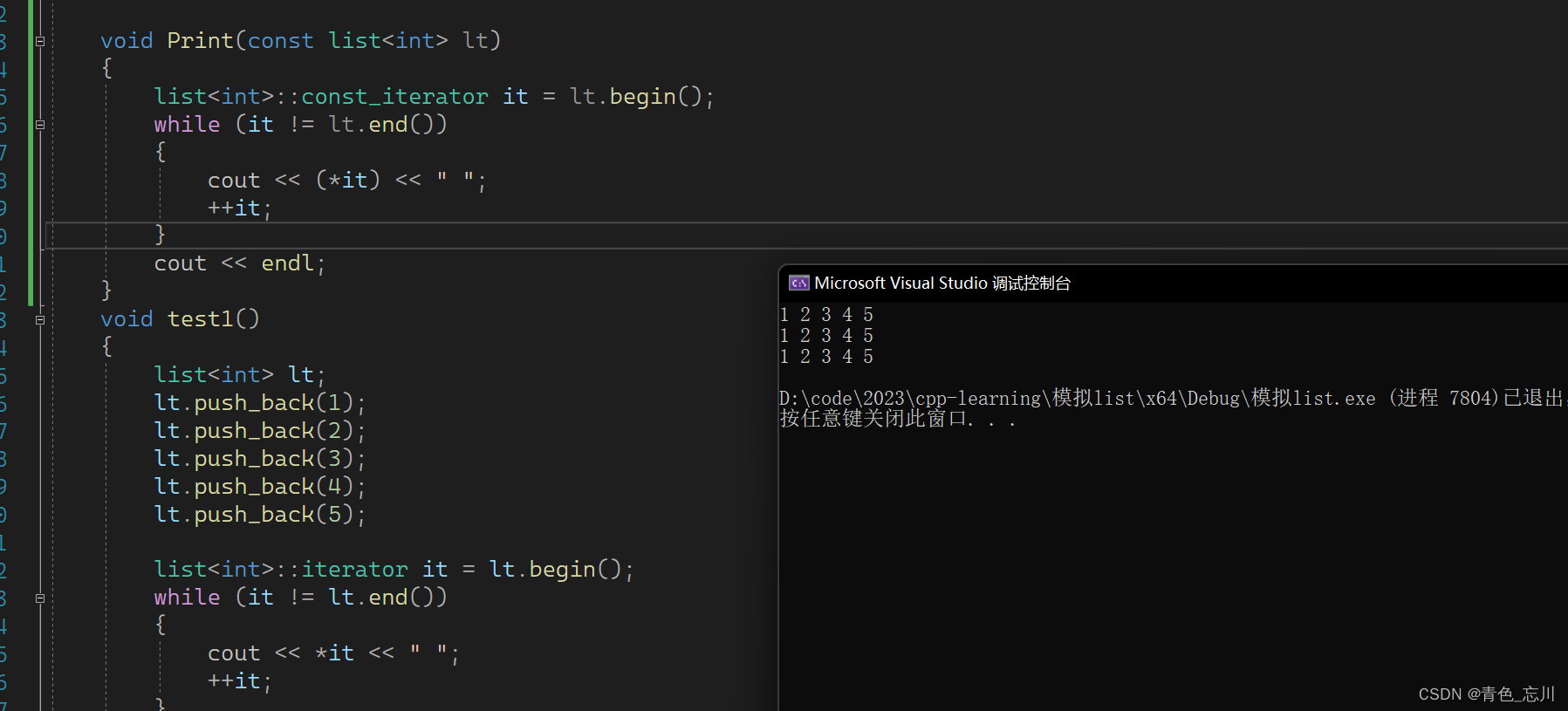
显然是可以的,不过还是刚才那个问题,这个迭代器太冗余了。因为仅仅就是一个返回值不一样而已,那么我们能否去改善呢?其实是可以的。我们可以通过一个类型去控制这个返回值,而要控制这个类型,就需要增加一个模板参数即可
我们可以这样做
在迭代器类中添加一个Ref参数

然后让*的运算符重载返回这个模板参数。

最后我们在list类中定义const_iterator的时候这样定义。

如此一来,很巧妙的解决了代码冗余的问题。虽然说从实际上来说并无太大变化。本质还是两个迭代器类。但是使我们的代码更加精简了
不过这样一来虽然list精简了,但是按照我们之前的迭代器代码,后面的大部分迭代器类型都需要大幅度改动,于是我们不妨使用typedef一下。以防后序再次修改。
如下代码所示:
template<class T, class Ref>
struct __list_iterator
{
typedef list_node<T> Node;
typedef __list_iterator<T, Ref> self;
Node* _node;
__list_iterator(Node* node)
:_node(node)
{}
Ref operator*()
{
return _node->_val;
}
self& operator++()
{
_node = _node->_next;
return *this;
}
self operator++(int)
{
self tmp(*this);
_node = _node->_next;
return tmp;
}
bool operator!=(const self & it)
{
return _node != it._node;
}
bool operator==(const self & it)
{
return _node == it._node;
}
};
当然现在还没完,还有时候,我们可能会写出这样的代码
struct A
{
A(int a = 0, int b = 0)
:_a(a)
,_b(b)
{}
int _a;
int _b;
};
void test2()
{
list<A> lt;
lt.push_back(A(1, 1));
lt.push_back(A(2, 2));
lt.push_back(A(3, 3));
lt.push_back(A(4, 4));
lt.push_back(A(5, 5));
list<A>::iterator it = lt.begin();
while (it != lt.end())
{
cout << it->_a << " ";
it++;
}
cout << endl;
}
在这里我们显然发现是无法正常运行的。由于迭代器是类似于指针的操作,我们有时候就需要->操作符去解引用。所以我们就需要写一个->的运算符重载。
T* operator->()
{
return &_node->_val;
}
如上所示,是写在迭代器里面的operator运算符重载。
利用这个运算符重载我们就可以跑上面的代码了
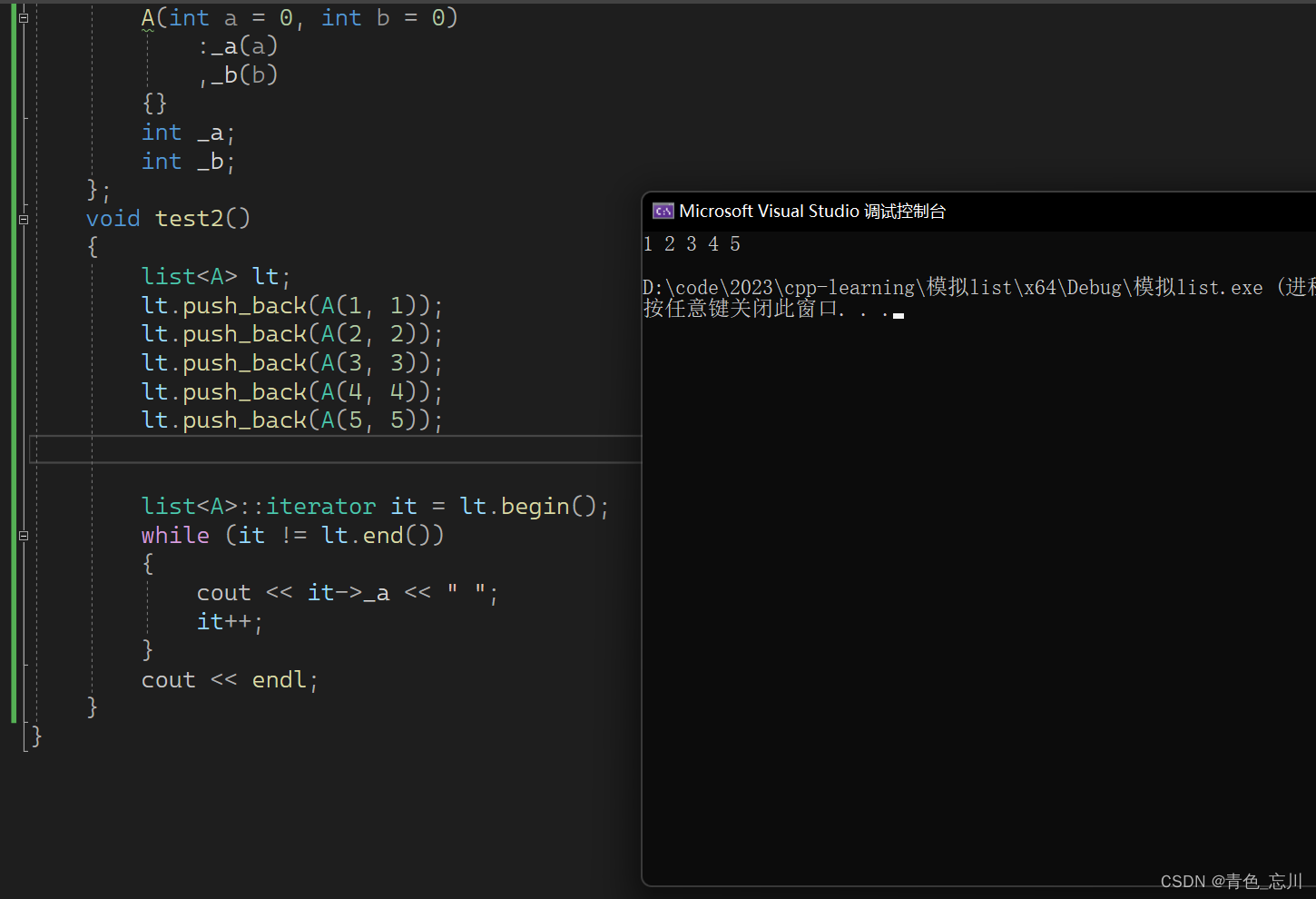
然而当我们细心的话,我们会发现这个运算符重载是比较怪异的。哪里怪异呢?
首先我们这个运算符重载返回的是什么呢?是A*,也就是说它还需要一次->解引用才能找到真正的值。那么我们这里为什么可行呢?
严格来说,it->->_a,才是符合语法的。
因为运算符重载要求可读性,那么编译器特殊处理,省略了一个->
上面这个运算符重载仅仅只是针对于普通对象的,如果是const对象的话,那么我们只能使用跟*运算符重载一样的处理方法,多传一个参数,才可以解决这个问题。也就是我们需要三个模板参数才可以。
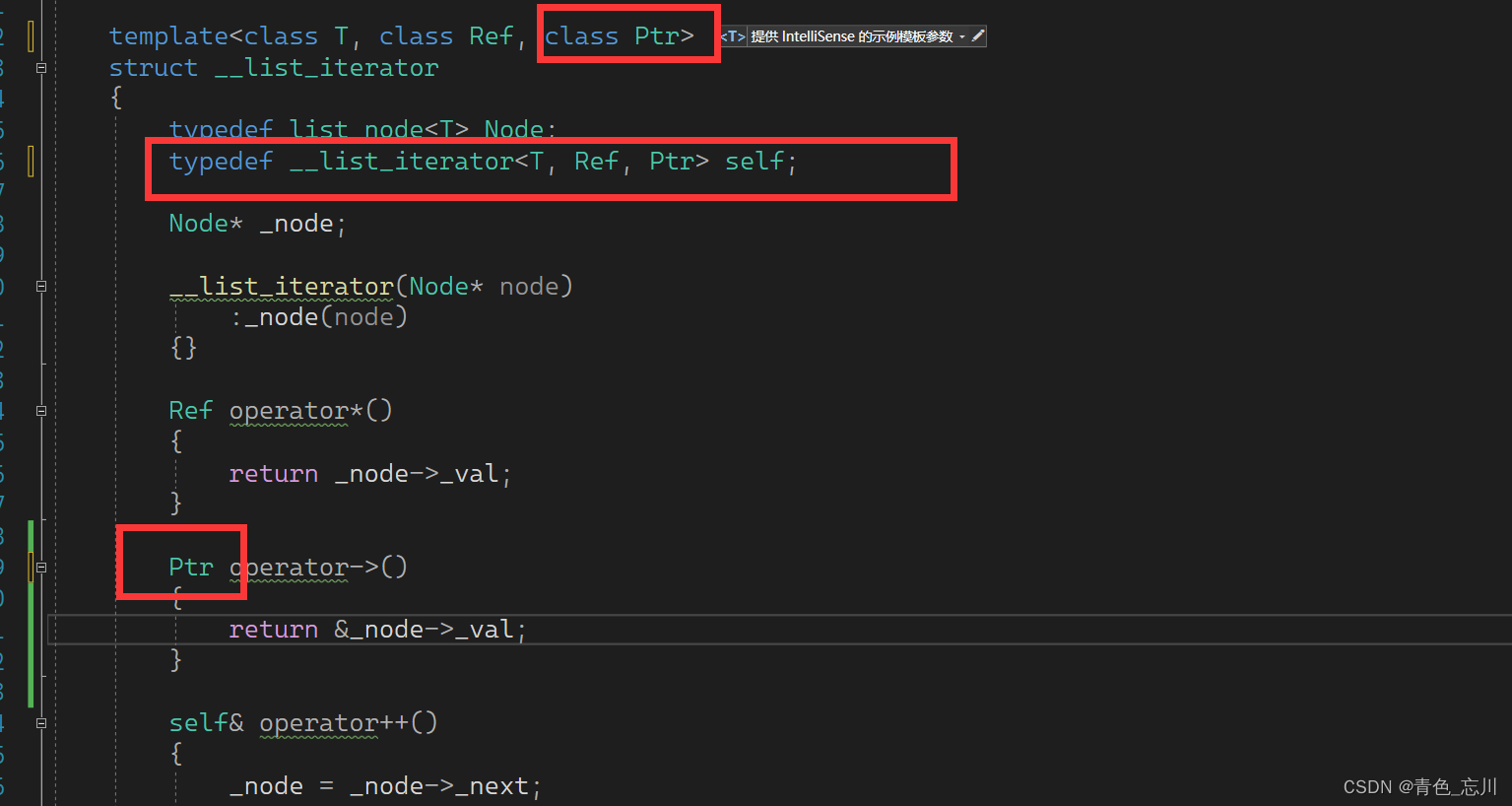
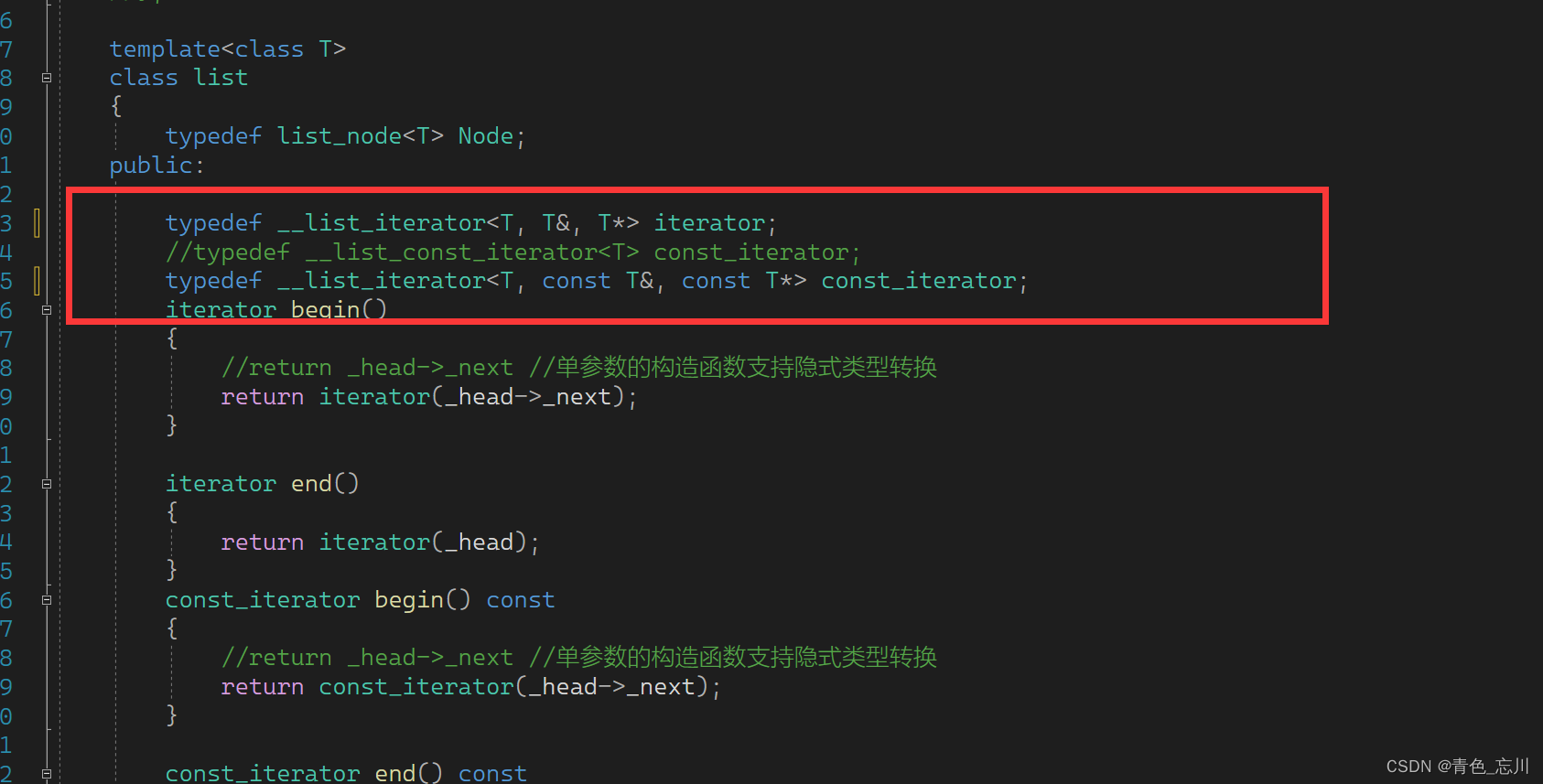
最终我们的迭代器代码如下所示
template<class T, class Ref, class Ptr>
struct __list_iterator
{
typedef list_node<T> Node;
typedef __list_iterator<T, Ref, Ptr> self;
Node* _node;
__list_iterator(Node* node)
:_node(node)
{}
Ref operator*()
{
return _node->_val;
}
Ptr operator->()
{
return &_node->_val;
}
self& operator++()
{
_node = _node->_next;
return *this;
}
self operator++(int)
{
self tmp(*this);
_node = _node->_next;
return tmp;
}
self& operator--()
{
_node = _node->_prev;
return *this;
}
self operator--(int)
{
self tmp(*this);
_node = _node->_prev;
return tmp;
}
bool operator!=(const self & it) const
{
return _node != it._node;
}
bool operator==(const self & it) const
{
return _node == it._node;
}
};
8.list的insert、erase等接口
当我们实现了迭代器以后,剩余的接口其实就很简单了,与C语言中list的实现是一模一样的。
void push_back(const T& val)
{
//insert(end(), val);
Node* newnode = new Node(val);
Node* tail = _head->_prev;
tail->_next = newnode;
newnode->_prev = tail;
newnode->_next = _head;
_head->_prev = newnode;
}
void push_front(const T& val)
{
insert(begin(), val);
}
void pop_back()
{
erase(--end());
}
void pop_front()
{
erase(begin());
}
iterator insert(iterator pos, const T& val)
{
Node* newnode = new Node(val);
Node* cur = pos._node;
Node* prev = cur->_prev;
prev->_next = newnode;
newnode->_prev = prev;
newnode->_next = cur;
cur->_prev = newnode;
return newnode;
}
iterator erase(iterator pos)
{
assert(pos != end());
Node* cur = pos._node;
Node* prev = cur->_prev;
Node* next = cur->_next;
delete cur;
cur = nullptr;
prev->_next = next;
next->_prev = prev;
return next;
}
9.size
对于这个size,我们有两种方法,第一种如下所示,我们直接遍历统计。这样时间复杂度是O(N)
size_t size()
{
size_t sz = 0;
iterator it = begin();
while (it != end())
{
it++;
sz++;
}
return sz;
}
还有一种方法是增加一个私有成员变量_size,当插入数据的时候加一,当删除数据的时候减一即可。还有构造函数我们也需要初始化一下这个_size。
这样一来,我们只需要将前面的代码都给修改一下即可。
10.list的clear
对于clear,我们直接复用前面的接口即可。
void clear()
{
iterator it = begin();
while (it != end())
{
it = erase(it);
}
}
11.list的析构函数
析构函数也是很简单的,析构和clear的区别就是析构会删除头节点,而clear不会删除头节点。
~list()
{
clear();
delete _head;
_head = nullptr;
}
12.list拷贝构造函数
我们这里已经涉及到资源的申请与释放了,所以我们必须得构造一个深拷贝构造函数
list(const list<T>& lt)
{
_head = new Node;
_head->_next = _head;
_head->_prev = _head;
_size = 0;
for (auto& e : lt)
{
push_back(e);
}
}
当然在这里我们可能会觉得拷贝构造和默认构造有点重复了。我们可以对前面重复的部分在封装一个函数,从而简化代码
void empty_init()
{
_head = new Node;
_head->_next = _head;
_head->_prev = _head;
_size = 0;
}
list()
{
//_head = new Node;
//_head->_next = _head;
//_head->_prev = _head;
//_size = 0;
empty_init();
}
list(const list<T>& lt)
{
//_head = new Node;
//_head->_next = _head;
//_head->_prev = _head;
//_size = 0;
empty_init();
for (auto& e : lt)
{
push_back(e);
}
}
13.赋值运算符重载
如下所示,这个也是比较简单,我们直接使用现代写法即可
void swap(list<T>& lt)
{
std::swap(_head, lt._head);
std::swap(_size, lt._size);
}
list<T>& operator=(list<T> lt)
{
swap(lt);
return *this;
}
这里我们还有一个东西需要注意的是
我们也许会发现,库里面的函数返回值和形参写的是类名,而不是类型

这个的话,是因为在类模板里面写成员函数的时候,是允许用类名代替类型的。
即我们的代码下面这些部分可以直接换为类名,但是呢,这里不建议使用,因为会降低可读性。
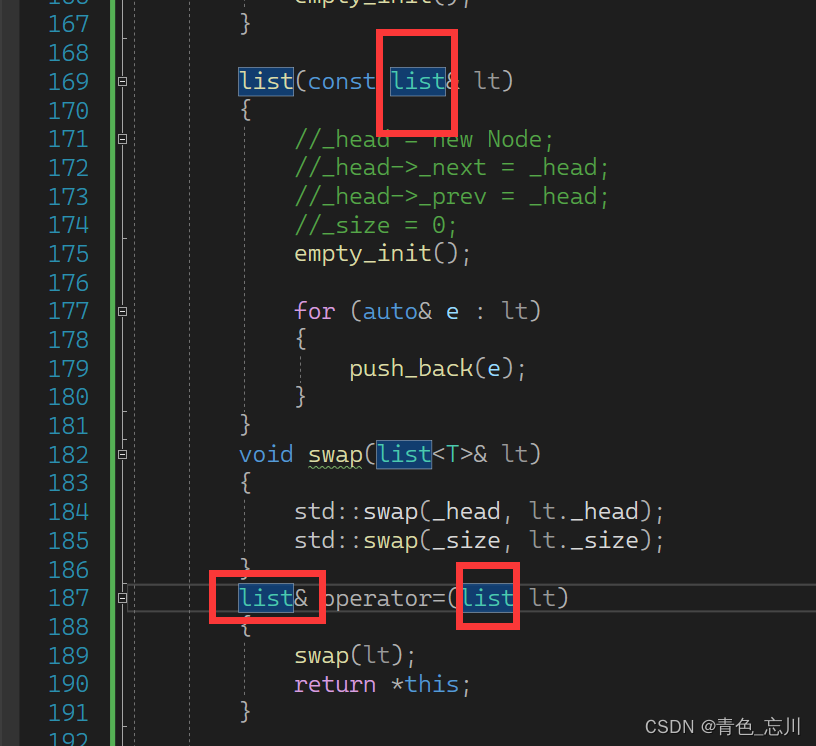
14. 测试代码
我们现在用如下的代码可以测试出以上的全部函数的使用
void test3()
{
list<int> lt;
lt.push_back(1);
lt.push_back(2);
lt.push_back(3);
lt.push_back(4);
lt.push_back(5);
list<int>::iterator it = lt.begin();
while (it != lt.end())
{
cout << *it << " ";
++it;
}
cout << endl;
lt.push_front(6);
lt.push_front(7);
lt.push_front(8);
lt.push_front(9);
lt.push_front(10);
for (auto e : lt)
{
cout << e << " ";
}
cout << endl;
Print(lt);
cout << lt.size() << endl;
lt.clear();
cout << lt.size() << endl;
lt.push_back(1);
lt.push_back(2);
lt.push_back(3);
lt.push_back(4);
lt.push_back(5);
it = lt.begin();
it++;
for (auto e : lt)
{
cout << e << " ";
}
cout << endl;
it = lt.insert(it, 100);
for (auto e : lt)
{
cout << e << " ";
}
cout << endl;
it--;
it = lt.insert(it, 200);
for (auto e : lt)
{
cout << e << " ";
}
cout << endl;
++it;
it = lt.insert(it, 300);
for (auto e : lt)
{
cout << e << " ";
}
cout << endl;
--it;
it = lt.erase(it);
for (auto e : lt)
{
cout << e << " ";
}
cout << endl;
lt.pop_back();
lt.pop_front();
for (auto e : lt)
{
cout << e << " ";
}
cout << endl;
list<int> lt2;
lt2.push_back(1);
lt2 = lt;
for (auto e : lt2)
{
cout << e << " ";
}
cout << endl;
}
经测试,运行结果正常
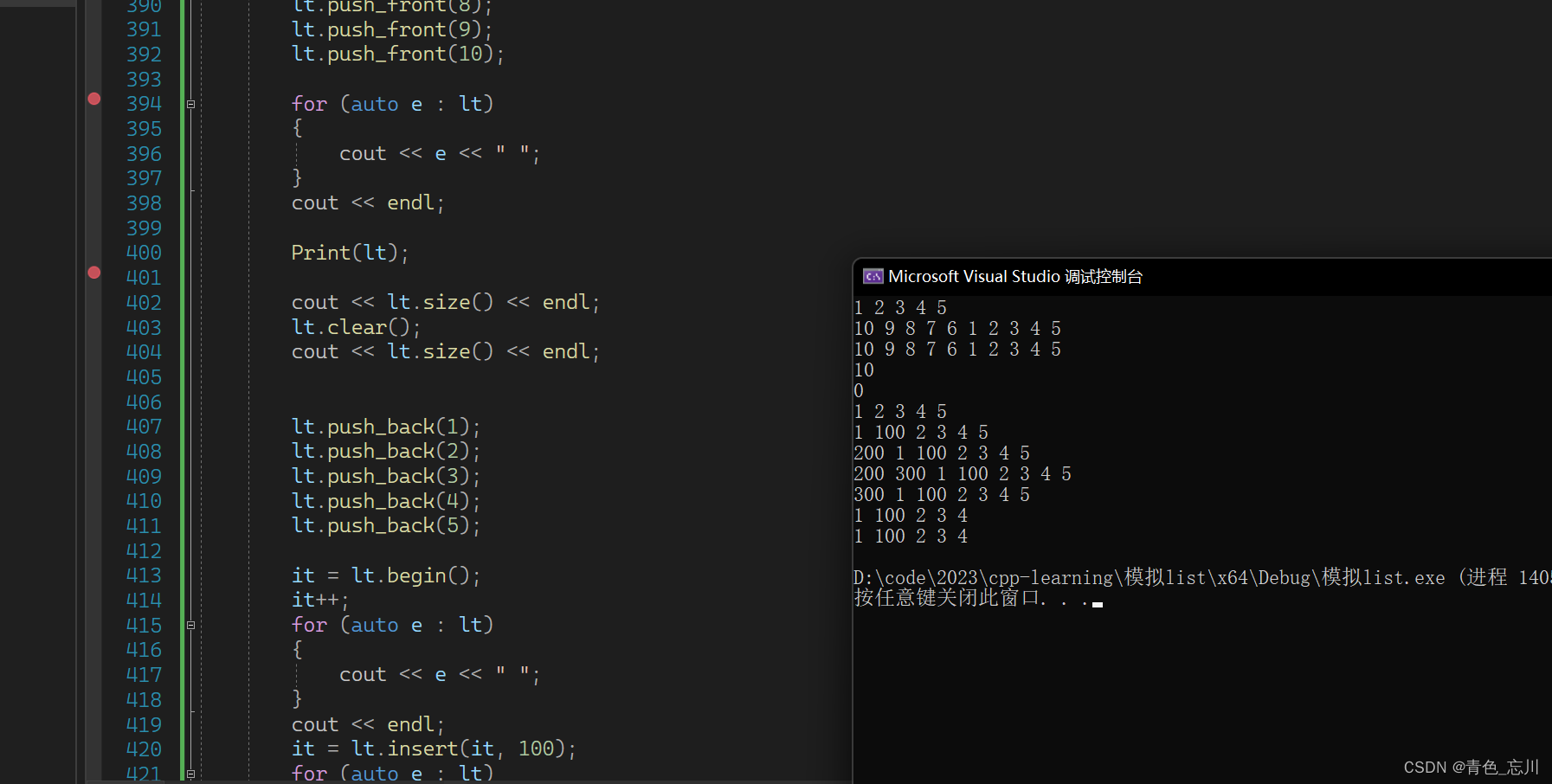
三、模拟list类的全部代码
#define _CRT_SECURE_NO_WARNINGS 1
#include<iostream>
#include<list>
#include<assert.h>
using namespace std;
namespace Sim
{
template<class T>
struct list_node
{
list_node<T>* _next;
list_node<T>* _prev;
T _val;
list_node(const T& val = T())
:_next(nullptr)
,_prev(nullptr)
,_val(val)
{}
};
template<class T, class Ref, class Ptr>
struct __list_iterator
{
typedef list_node<T> Node;
typedef __list_iterator<T, Ref, Ptr> self;
Node* _node;
__list_iterator(Node* node)
:_node(node)
{}
Ref operator*()
{
return _node->_val;
}
Ptr operator->()
{
return &_node->_val;
}
self& operator++()
{
_node = _node->_next;
return *this;
}
self operator++(int)
{
self tmp(*this);
_node = _node->_next;
return tmp;
}
self& operator--()
{
_node = _node->_prev;
return *this;
}
self operator--(int)
{
self tmp(*this);
_node = _node->_prev;
return tmp;
}
bool operator!=(const self & it) const
{
return _node != it._node;
}
bool operator==(const self & it) const
{
return _node == it._node;
}
};
//template<class T>
//struct __list_const_iterator
//{
// typedef list_node<T> Node;
// Node* _node;
// __list_const_iterator(Node* node)
// :_node(node)
// {}
// const T& operator*()
// {
// return _node->_val;
// }
// __list_const_iterator<T>& operator++()
// {
// _node = _node->_next;
// return *this;
// }
// __list_const_iterator<T> operator++(int)
// {
// __list_const_iterator<T> tmp(*this);
// _node = _node->_next;
// return tmp;
// }
// bool operator!=(const __list_const_iterator<T>& it)
// {
// return _node != it._node;
// }
// bool operator==(const __list_const_iterator<T>& it)
// {
// return _node == it._node;
// }
//};
template<class T>
class list
{
typedef list_node<T> Node;
public:
typedef __list_iterator<T, T&, T*> iterator;
//typedef __list_const_iterator<T> const_iterator;
typedef __list_iterator<T, const T&, const T*> const_iterator;
iterator begin()
{
//return _head->_next //单参数的构造函数支持隐式类型转换
return iterator(_head->_next);
}
iterator end()
{
return iterator(_head);
}
const_iterator begin() const
{
//return _head->_next //单参数的构造函数支持隐式类型转换
return const_iterator(_head->_next);
}
const_iterator end() const
{
return const_iterator(_head);
}
void empty_init()
{
_head = new Node;
_head->_next = _head;
_head->_prev = _head;
_size = 0;
}
list()
{
//_head = new Node;
//_head->_next = _head;
//_head->_prev = _head;
//_size = 0;
empty_init();
}
list(const list<T>& lt)
{
//_head = new Node;
//_head->_next = _head;
//_head->_prev = _head;
//_size = 0;
empty_init();
for (auto& e : lt)
{
push_back(e);
}
}
void swap(list<T>& lt)
{
std::swap(_head, lt._head);
std::swap(_size, lt._size);
}
list<T>& operator=(list<T> lt)
{
swap(lt);
return *this;
}
void push_back(const T& val)
{
insert(end(), val);
//Node* newnode = new Node(val);
//Node* tail = _head->_prev;
//tail->_next = newnode;
//newnode->_prev = tail;
//newnode->_next = _head;
//_head->_prev = newnode;
}
void push_front(const T& val)
{
insert(begin(), val);
}
void pop_back()
{
erase(--end());
}
void pop_front()
{
erase(begin());
}
iterator insert(iterator pos, const T& val)
{
Node* newnode = new Node(val);
Node* cur = pos._node;
Node* prev = cur->_prev;
prev->_next = newnode;
newnode->_prev = prev;
newnode->_next = cur;
cur->_prev = newnode;
++_size;
return newnode;
}
iterator erase(iterator pos)
{
assert(pos != end());
Node* cur = pos._node;
Node* prev = cur->_prev;
Node* next = cur->_next;
delete cur;
cur = nullptr;
prev->_next = next;
next->_prev = prev;
--_size;
return next;
}
size_t size()
{
//size_t sz = 0;
//iterator it = begin();
//while (it != end())
//{
// it++;
// sz++;
//}
//return sz;
return _size;
}
~list()
{
clear();
delete _head;
_head = nullptr;
}
void clear()
{
iterator it = begin();
while (it != end())
{
it = erase(it);
}
}
private:
Node* _head;
size_t _size;
};
void Print(const list<int> lt)
{
list<int>::const_iterator it = lt.begin();
while (it != lt.end())
{
cout << (*it) << " ";
++it;
}
cout << endl;
}
void test1()
{
list<int> lt;
lt.push_back(1);
lt.push_back(2);
lt.push_back(3);
lt.push_back(4);
lt.push_back(5);
list<int>::iterator it = lt.begin();
while (it != lt.end())
{
cout << *it << " ";
++it;
}
cout << endl;
for (auto e : lt)
{
cout << e << " ";
}
cout << endl;
Print(lt);
}
struct A
{
A(int a = 0, int b = 0)
:_a(a)
,_b(b)
{}
int _a;
int _b;
};
void Print(const list<A>& lt)
{
list<A>::const_iterator it = lt.begin();
while (it != lt.end())
{
cout << it->_a << " ";
it++;
}
cout << endl;
}
void test2()
{
list<A> lt;
lt.push_back(A(1, 1));
lt.push_back(A(2, 2));
lt.push_back(A(3, 3));
lt.push_back(A(4, 4));
lt.push_back(A(5, 5));
cout << lt.size() << endl;
lt.clear();
cout << lt.size() << endl;
list<A>::iterator it = lt.begin();
while (it != lt.end())
{
cout << it->_a << " ";
it++;
}
cout << endl;
Print(lt);
}
void test3()
{
list<int> lt;
lt.push_back(1);
lt.push_back(2);
lt.push_back(3);
lt.push_back(4);
lt.push_back(5);
list<int>::iterator it = lt.begin();
while (it != lt.end())
{
cout << *it << " ";
++it;
}
cout << endl;
lt.push_front(6);
lt.push_front(7);
lt.push_front(8);
lt.push_front(9);
lt.push_front(10);
for (auto e : lt)
{
cout << e << " ";
}
cout << endl;
Print(lt);
cout << lt.size() << endl;
lt.clear();
cout << lt.size() << endl;
lt.push_back(1);
lt.push_back(2);
lt.push_back(3);
lt.push_back(4);
lt.push_back(5);
it = lt.begin();
it++;
for (auto e : lt)
{
cout << e << " ";
}
cout << endl;
it = lt.insert(it, 100);
for (auto e : lt)
{
cout << e << " ";
}
cout << endl;
it--;
it = lt.insert(it, 200);
for (auto e : lt)
{
cout << e << " ";
}
cout << endl;
++it;
it = lt.insert(it, 300);
for (auto e : lt)
{
cout << e << " ";
}
cout << endl;
--it;
it = lt.erase(it);
for (auto e : lt)
{
cout << e << " ";
}
cout << endl;
lt.pop_back();
lt.pop_front();
for (auto e : lt)
{
cout << e << " ";
}
cout << endl;
list<int> lt2;
lt2.push_back(1);
lt2 = lt;
for (auto e : lt2)
{
cout << e << " ";
}
cout << endl;
}
}
好了,本节内容就到这里了
本节内容难度稍大,希望读者可以好好阅读。有不懂的可以及时私聊博主解答疑惑
如果对你有帮助的话,不要忘记点赞加收藏哦!!!
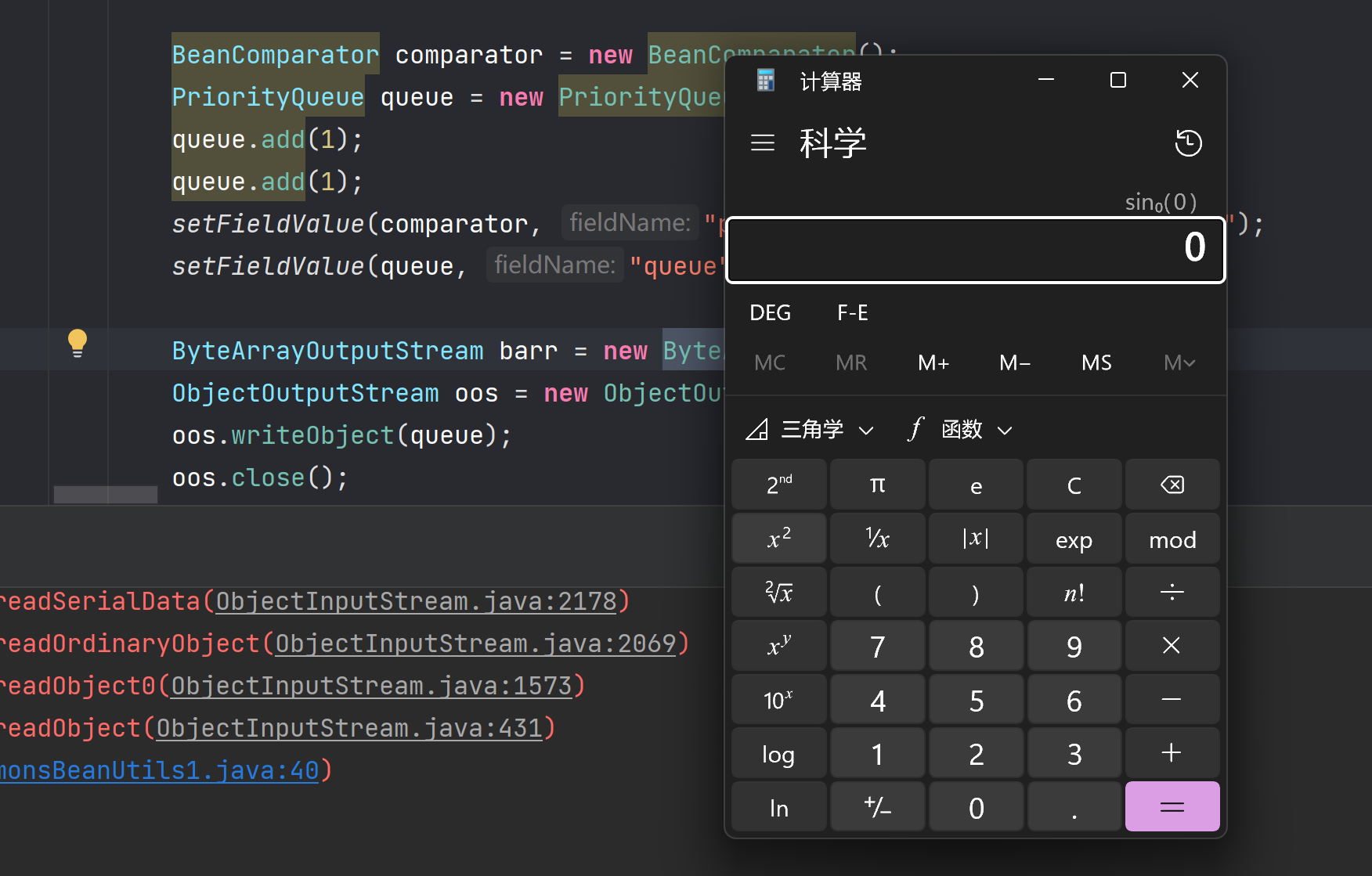

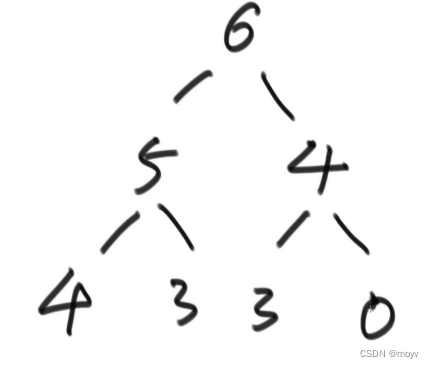





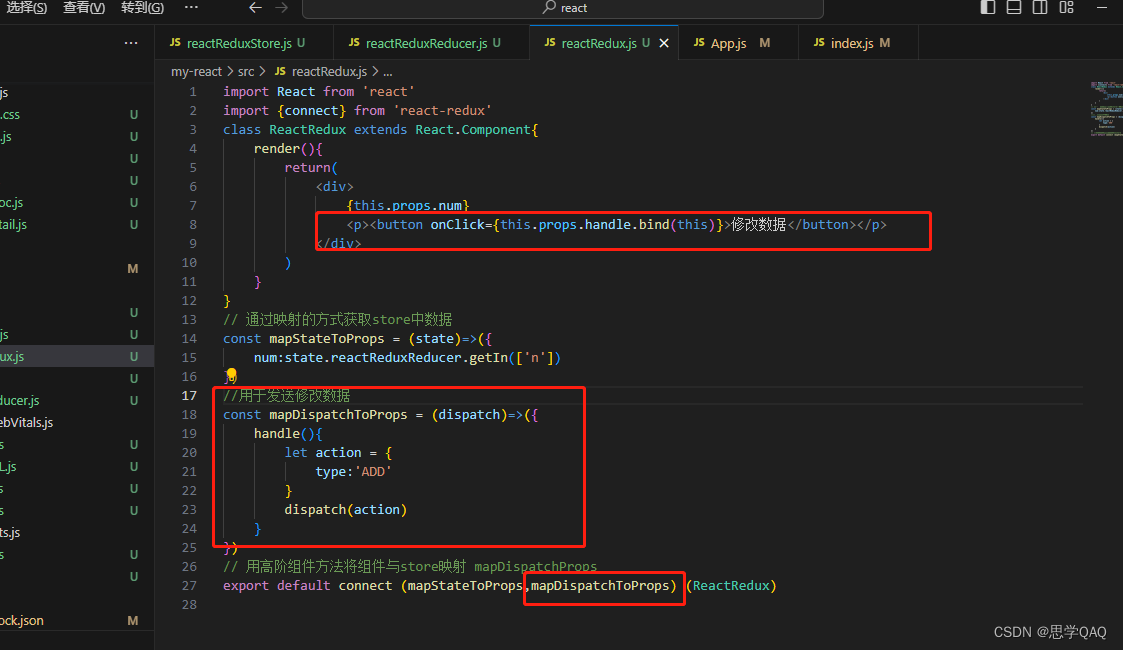


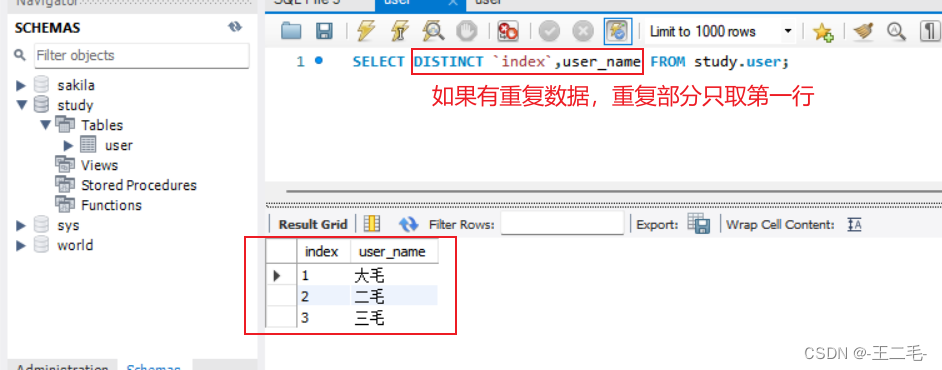



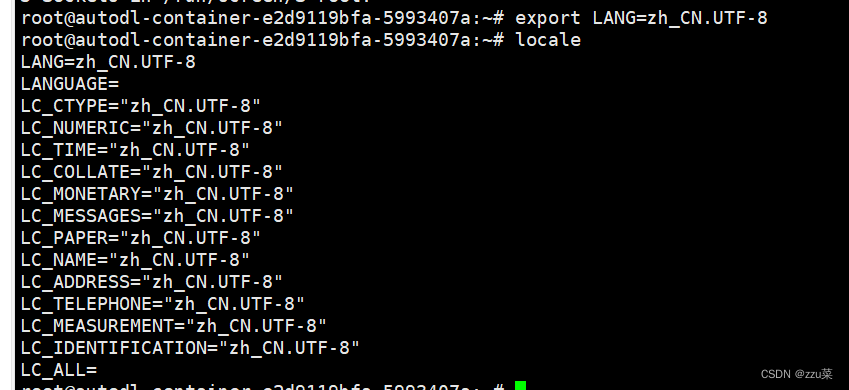
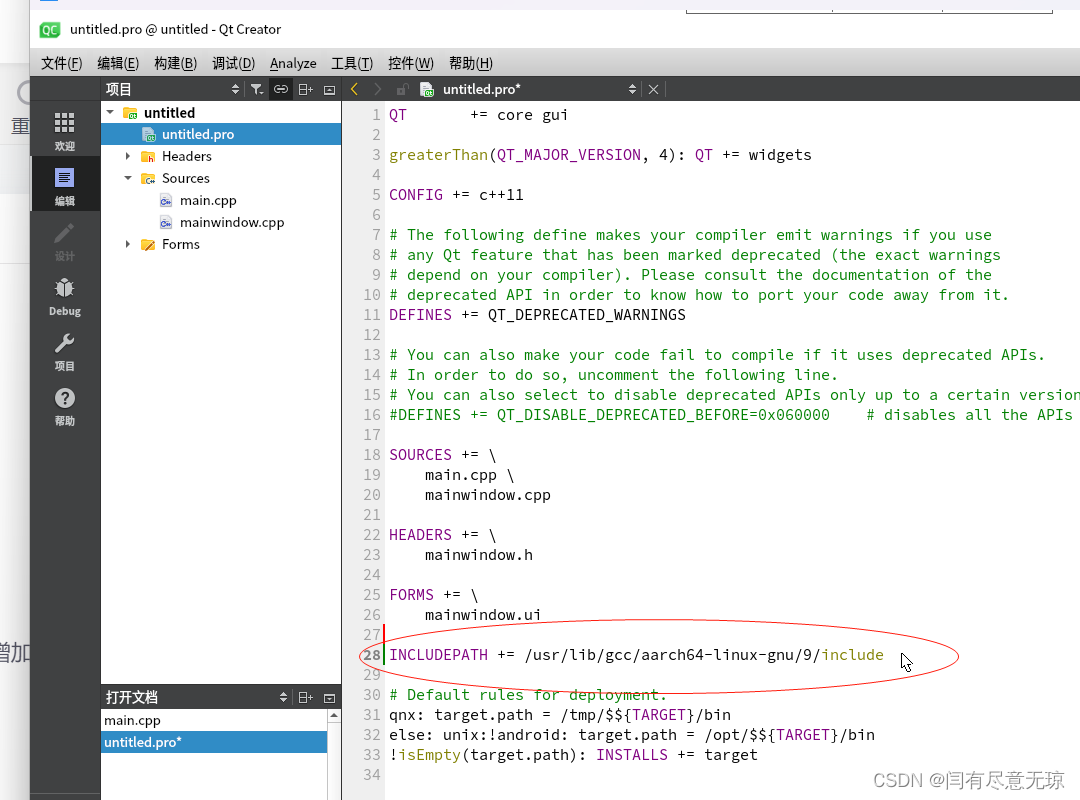

![[C++项目] Boost文档 站内搜索引擎(1): 项目背景介绍、相关技术栈、相关概念介绍...](https://img-blog.csdnimg.cn/img_convert/a0d24a580831ed4856a2c7d8331b55e8.png)
